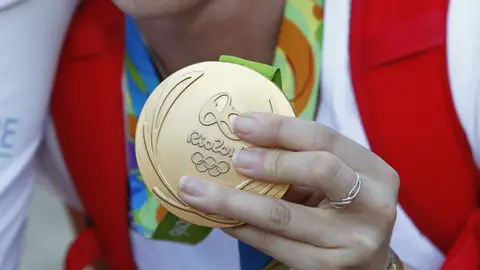The Olympics Are About To Make It A Lot Harder For Transgender Athletes To Compete

New regulations from the International Olympic Committee will make it harder for transgender women to compete in the 2020 Summer Games in Tokyo. The IOC is expected to issue guidelines to 55 sports federations that will halve the permitted level of testosterone allowed in women’s events from archery to weightlifting.
According to The Times of London, acceptable levels will likely be cut in half, from ten to five nanomoles per liter. The revised guidelines come days after transgender weightlifter Laurel Hubbard competed at the Commonwealth Games. The 40-year-old New Zealander was favored to dominate until she was sidelined by injury.
Trans athletes who underwent gender confirmation surgery were first allowed to compete in the 2004 Winter Olympics, provided they had been on hormones for at least two years after surgery and legally changed their gender. In 2015, the surgical requirement was dropped and the period on hormones was lowered to a year. Still, to date, no openly transgender athlete has competed in the Olympics.
But using testosterone levels to determine eligibility affects more than just trans competitors: Indian sprinter Dutee Chand was actually disqualified after she was discovered to have naturally elevated levels of testosterone. She appealed the ruling, though, and can compete. For now.
Runner Caster Semenya also has a genetic condition characterized by heightened levels of testosterone. After the International Association of Athletics Federations (IAAF) forced her to undergo gender testing in 2009, the results were leaked and she was hounded mercilessly by the press and on social media. The federation ruled that intersex athletes like Semenya had to either undergo hormone replacement therapy or have surgery to regulate their testosterone levels. (FThose rules were suspended in time for Semenya to run the 2016 Summer Games.)
But the IAAF is also expected this week to announce lower testosterone levels for women competing in the 400m, 800m and 1500m races. Those are the events Semena excelled in at the 2018 Commonwealth Games, leading critics complain the new rules are a smokescreen to specifically keep her out.
There has been great debate within both the scientific community and the athletic world on how much advantage a transgender woman actually has against a cisgender opponent. Joanna Harper, a trans woman and IOC advisory committee member, agrees that testosterone needs to be monitored: She was actually the one who recommended tightening the permitted levels.
"Transgender women after hormone therapy are taller, bigger and stronger on average than cisgender women,” Harper, a competitive marathon runner before she transitioned, told The Australian. "But that does not [necessarily] make it unfair."
She cites boxing, where athletes are divided into weight classes, as an example.
"In a given weight class a trans woman boxer is not going to be bigger than the women she is fighting in the ring. In high levels of sport, transgender women are substantially underrepresented. That indicates that whatever physical advantages transgender women have—and they certainly exist—they are not nearly as large as the sociological disadvantages.”
But what about sports not divided by weight class?
Jillian Bearden and Rachel McKinnon are both trans women, both cyclists, and both hope to make the Tokyo Games. But while Bearden supports regulating testosterone, McKinnon believes subjecting trans women to testosterone blocking is a human rights violation.
“I’ve proven how powerful testosterone is from when I competed” before transitioning, Bearden told USA Today. “That doesn’t mean specifically that the more testosterone you have the stronger you are, but the hormone provides a certain stamina that continues to charge you. It gives you that edge of pushing power.”
Tifanny Abreu is the first transgender athlete in Brazil’s Superliga, the country’s top women’s volleyball tournament. Before transitioning in 2012, she played in men’s leagues in Brazil, Portugal, France, France, and Belgium. Having surgically transitioned and controlled her testosterone levels through hormonal treatment, she wants to have a chance in Tokyo. Last year she got authorization from the International Volleyball Federation to play in women’s teams.
“I am obeying the rules," Abreu, 33, told the AP. "It is not as if I could just say I am a trans athlete and want to play.”
Veteran coach Jose Roberto Guimaraes told newspaper Estado de Sao Paulo that, assuming she earns a spot, he doesn’t see a reason why she couldn't. “Tifanny is legally able to play in the Superliga, so I don’t see any problem in calling her [for the Olympics]," said Guimaraes, who's helped Brazil take home gold three times.
Meanwhile, Tia Thompson hopes to be the first trans player on the U.S. women's volleyball team. After waiting three years, she got approval this year from USA Volleyball to compete as a woman in Tokyo.
But not everyone is happy: Former Brazilian gold-medal volleyballer Ana Paula Henkel says Abreu and Thompson shouldn't be allowed to compete with women. “It is not a matter of prejudice, it is physiology. Most players don’t think it is fair for transsexuals to play against women. And it is not." Their bodies, she insists, benefit from being "filled with testosterone all life long.”
Abreu, at least, is remaining positive, and wants other trans athletes to do the same. “As long as their harmonization [of hormones] is correct, the rules are on their side," she tells The Australian. "They have the right to be happy, too.”





